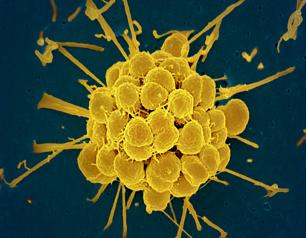123 Results
SARS-CoV-2 Rapidly Evolves in People with Advanced HIV
A NIAID study revealed how some variants of SARS-CoV-2—the virus that causes COVID-19—could evolve. The researchers used cutting-edge technology to examine genes from SARS-CoV-2 in people with and without HIV who also had COVID-19, looking at the different copies of the virus in individuals over time. They found that people with advanced HIV—as defined by reduced numbers of immune cells called CD4+ T cells—had dozens of SARS-CoV-2 variants in their bodies, compared to just one major variant in most people without HIV and people with HIV who had higher numbers of CD4+ T cells.
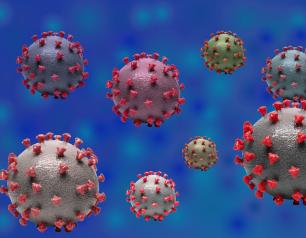
Bringing HIV Study Protocols to Life with Representative, High-Quality Research
The HIV clinical trials network sites have made tremendous contributions to NIH’s scientific priorities by offering direct access to and consultation with populations most affected by HIV globally, and by delivering high-quality clinical research with strong connections to trusted community outreach platforms. Future networks will need to maintain core strengths of current models while expanding capacity in areas vital to further scientific progress. These include operations that inform pandemic responses and extending our reach within communities impacted by HIV, including populations historically underrepresented in clinical research.
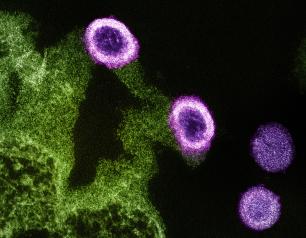
World Mosquito Day 2024—The Metabolic Mysteries of Mosquito Metabolism
Mosquitoes are considered one of the most dangerous animals on earth because of their broad distribution and the many pathogens they transmit to humans. Dr. Patricia Scaraffia, Associate Professor at the Tulane University School of Public Health and Tropical Medicine, has dedicated her career to understanding the metabolism of the mosquito species that carries the pathogens responsible for dengue, Zika, chikungunya, and yellow fever to humans. NIAID reached out to Dr. Scaraffia about her team’s research.
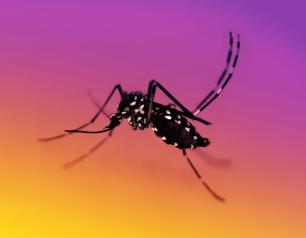
NIAID Funds Cutting-Edge Genomics and Bioinformatics Programs
NIAID has announced six awards to continue the Genomics Centers for Infectious Diseases (GCIDs) and Bioinformatics Resource Centers (BRCs) for Infectious Diseases, both important data science networks offering critical resources for the scientific community.
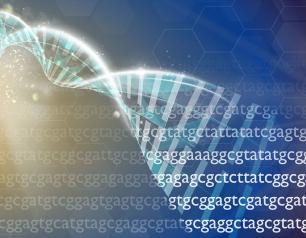
Charting the Path to an HIV-Free Generation
NIAID supports four research networks as part of its HIV clinical research enterprise. Every seven years, the Institute engages research partners, community representatives, and other public health stakeholders in a multidisciplinary evaluation of network progress toward short- and long-term scientific goals. Pregnancy, childbirth and the postnatal period are a key focus of NIAID HIV research and call for measures to support the health of people who could become pregnant as well as their infants.
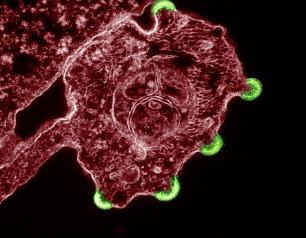
Broadly Neutralizing Antibodies Evaluated in Many HIV Cure Strategies
Many promising HIV cure strategies use broadly neutralizing antibodies, or bNAbs, which can neutralize a wide range of HIV variants, homing in on and binding to specific viral components, and then acting to destroy the virus by triggering an immune response. Several HIV bNAbs have been developed and tested to determine whether they can prevent or treat HIV. NIAID and partners are evaluating bNAb-based strategies alone and in combination with other immunity-enhancing strategies for HIV clearance in clinical trials in in Africa, North and South America, and Southeast Asia.
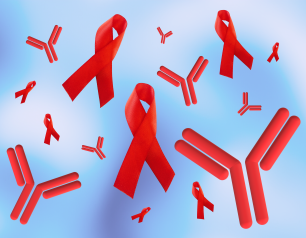
NIAID Research to Eliminate the Threat of Viral Hepatitis Across the Globe
Viral hepatitis affects the lives of about one in twenty people in the world, resulting in over a million deaths each year. NIAID is working on many ways to prevent and treat the different types of hepatitis, including the development of vaccines and improved therapeutics and diagnostics. July 28 is observed annually as World Hepatitis Day, providing an opportunity to reflect on the impact of hepatitis on global health and focus on strategies to reduce its burden. To observe World Hepatitis Day, NIAID highlights recent advancements researchers have made in these areas.
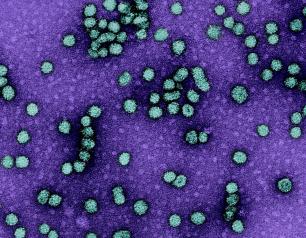
AIDS 2024: Long-Acting Injectables, Bi-Directional Learning, PACHA & More (VIDEO)
HIV.gov continued daily coverage of AIDS 2024. Tune in to four conversations livestreamed at the conference.

We should leverage the successes of HIV care to prevent overdose mortality
This blog is cross-posted from the National Institute on Drug Abuse and written by Dr. Nora Volkow, director of the National Institute on Drug Abuse (NIDA) and Dr. Jeanne Marrazzo, director of the National Institute of Allergy and Infectious Diseases.
For complex reasons, HIV and substance use have been inextricably linked since the HIV epidemic began more than four decades ago. Consequently, it...

AIDS 2024: Research Updates, HIV Criminalization Laws, and AI (VIDEO)
HIV.gov continued daily coverage of AIDS 2024. This blog post includes recaps of four livestreamed conversations.
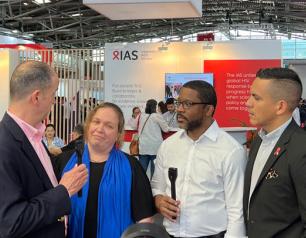
AIDS 2024: NIH Research Updates, Inequities, U=U, and Doxy PrEP (VIDEO)
The AIDS 2024 conference is taking place in Munich, Germany. HIV.gov is providing daily coverage.

A New Way to Measure and Predict Human Immune Health
The immune system senses and responds to changes in physiologic health, and a new tool called the immune health metric (IHM) can measure and even predict some of these changes, an NIAID study has found. If doctors could use the IHM to detect health problems long before symptoms appear, they could potentially act early to prevent disease, the investigators suggest.
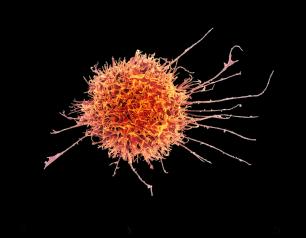
The Hidden Link Between Malaria and Lupus
Scientists have long been aware that malaria infection is associated with high levels of autoantibodies—antibodies that recognize and attack the person’s own tissues and are associated with autoimmune disorders. NIAID researchers, along with their colleagues, have studied the molecular mechanisms of these autoantibodies. Their findings reveal the associations between malaria, human resistance to it, and autoantibodies that are linked to certain autoimmune disorders—specifically, systemic lupus erythematosus (SLE).
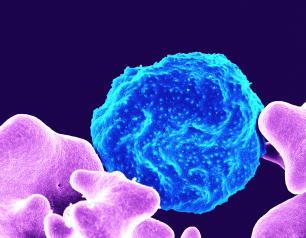
Exploring the Potential of Pharmacies to Increase Access to HIV Testing
In 2022, an estimated 31,800 people were diagnosed with HIV in the United States. Although HIV incidence has declined by 12% from 2018 to 2022, many people are still undiagnosed due to limited access to HIV testing resources.
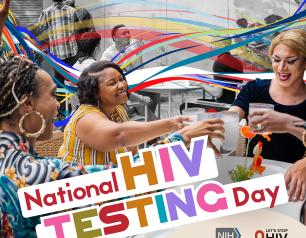
Our Words Have Power—NIAID Embraces Respectful, Inclusive, and Person-First Language
by Jeanne Marrazzo, M.D., M.P.H., NIAID Director
Our institute is responsible not only for advancing scientific knowledge, but for doing so in a way that honors the dignity, individuality, and autonomy of the people affected by the health issues we address. For this reason, I am very proud to share the updated NIAID HIV Language Guide, a thoroughly vetted resource to inform our written and verbal communications.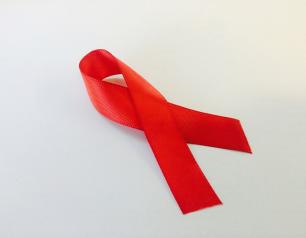
Stepping into Science
Realizing that traditional laboratory science – aka “bench research” – isn’t for everyone, staff at NIAID's Rocky Mountain Laboratories recently invited two dozen area high school students to experience not only traditional research but also the lesser-known careers that make bench research possible.
NIAID Raises Awareness to Malaria-like Diseases in W. Africa
NIAID scientists and colleagues have identified dengue, Zika and chikungunya viruses in the West African country of Mali, where health care providers could be misdiagnosing patients as having malaria. All four infectious diseases are caused by a mosquito bite.
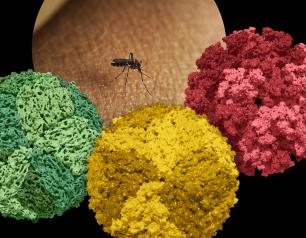
Antiretroviral Drug Improves Kidney Function After Transplant in People with HIV
An HIV drug that suppresses the activity of the CCR5 receptor—a collection of proteins on the surface of certain immune cells—was associated with better renal function in kidney transplant recipients with HIV compared to people who took a placebo in a randomized trial. According to the authors, these findings warrant further exploration of the benefit of CCR5 antagonists in all kidney transplant recipients regardless of HIV status. The findings of the NIAID-sponsored trial were presented today at the 2024 American Transplant Congress in Philadelphia.
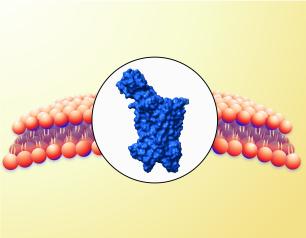
Unpacking the Interplay between Autoimmunity and Immunodeficiency
The presence of antibodies that target one of the body’s own proteins was associated with severe infections that typically only occur when a person’s immune system is suppressed, based on a multi-cohort study of blood samples from more than 1,000 people. This study suggests autoimmune processes could be involved in the development of immunodeficiency in adulthood.
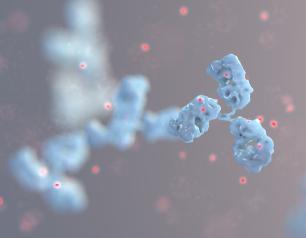
An Emergency Department Screening Strategy Identifies Asymptomatic and Undiagnosed Syphilis
As syphilis rates continue to rise in the United States, emergency departments may be a way for people with limited healthcare access to get screening and treatment.
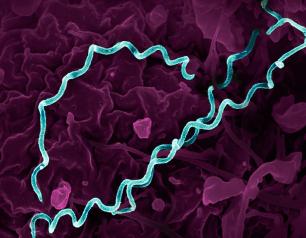
NIAID Research Team Develops 2nd Model of Crimean-Congo Fever
A NIAID research team has developed an additional nonhuman primate study model for Crimean-Congo hemorrhagic fever (CCHF), providing an alternative for development of critically needed vaccines and therapeutics.
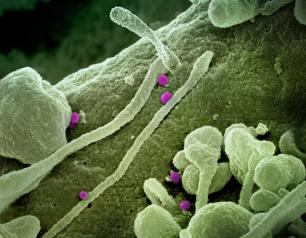
NIAID Targets Transport System as Lyme Disease Treatment
NIAID scientists and colleagues are investigating a potential treatment strategy against Lyme disease that would directly suppress Borrelia burgdorferi, the bacterium that causes the disease.
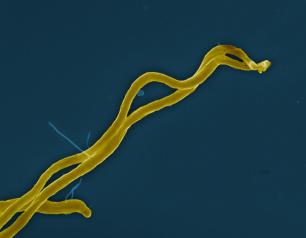
Proof-of-Concept Study Shows an HIV Vaccine Can Generate Key Antibody Response in People
An HIV vaccine candidate elicited trace levels of HIV broadly neutralizing antibodies and high levels of other key immune cells in an early-stage clinical trial. This immune response is an important signal that, if antibody levels can be further amplified, the vaccination strategy might be able to prevent HIV.
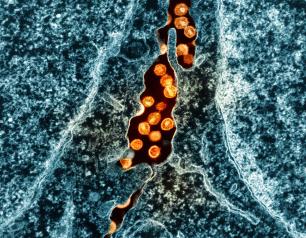
NIAID Marks HIV Vaccine Awareness Day 2024
On the 27th observance of HIV Vaccine Awareness Day (Saturday, May 18), we express our gratitude to the dedicated global community of scientists, advocates, study participants, study staff, and funders working toward a safe, effective, durable, and accessible HIV vaccine.

Exploring a Meningitis Vaccine for Gonorrhea Prevention
A preventive vaccine for gonorrhea would be a major advance in public health, according to an editorial co-authored by NIAID Director Jeanne Marrazzo. The genetic sequences of the bacteria that cause gonorrhea and meningitis B, are closely related. This has led researchers to explore whether the 4CMenB vaccine, approved by the Food and Drug Administration for meningitis B, might also prevent gonorrhea. NIAID is sponsoring an efficacy study of the 4CMenB vaccine for gonorrhea prevention.
